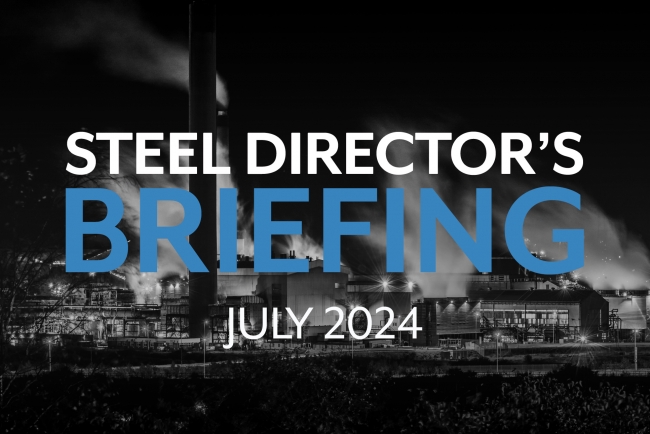Steel Director's Briefing - July 2024

Now that we have clarity on the next UK government, with Labour securing a significant majority, the steel industry is observing closely, mindful of the implications this new leadership may have on the sector.
In recent months, European steel prices have stabilised, indicating that steel producers are successfully balancing supply and demand. Major companies like POSCO are adjusting their capacities to align with actual market demand, and similar capacity restructuring is anticipated from other mills during the summer holiday period.
Prices from the Far East have been comparable to those of European mills. However, the most significant impact on price competitiveness has been from exchange rate fluctuations. For instance, recent volatility in the GBP/USD exchange rate has led to price adjustments of £35 to £40 per tonne.
The momentum towards sustainable production, particularly green steel, is increasing. At Cooper and Jackson, for example, there has been a noticeable rise in the number of quotation requests for green steel, with many OEMs requiring suppliers to have a decarbonisation strategy.
Despite the industry's commitment to decarbonising, it faces several practical and political challenges. The dependency on scrap steel for Electric Arc Furnaces (EAFs) raises concerns about its availability. Additionally, this reliance limits the variety of steel grades that can be produced. Questions remain about whether a limited number of blast furnaces will need to remain operational across the industry to meet demand for certain grades or if alternative production methods, such as the hydrogen-powered technology promoted by H2, can bridge the gap.
The political landscape is also influencing the shift to green steel production, exemplified by the situation at Tata Steel UK. Despite the uncertainty over how Tata will manage its transition to EAFs after announcing a £1.25bn investment in new furnaces at Port Talbot, they have begun importing substrate materials from outside the UK to maintain production continuity. The shutdown of number 5 blast furnace has begun this week, with the shutdown of number 4 blast furnace due later this year.
The potential impact on Tata’s ability to fulfil orders and the wider impact on the supply chain is a growing concern.
Labour's landslide victory could have a significant influence on this process. The Labour party has criticised the previous government's deal with Tata Steel and has suggested that Tata consider a union-backed plan to keep one of the blast furnaces operational until the EAF is ready. With Labour promising a £3bn "green steel fund," there is potential for a new deal that could preserve more jobs in the short term.
Labour’s manifesto also promises a new Industrial Strategy, which could provide the strategic direction needed to revitalise the sector. However, details are scant, and public confidence in politicians is low. The real test will be the substance of this strategy.
At Cooper and Jackson, like the rest of the nation, we will closely monitor the developments, hoping for a government that supports the manufacturing sector, providing clear direction and inspiring a new wave of investment and innovation.
